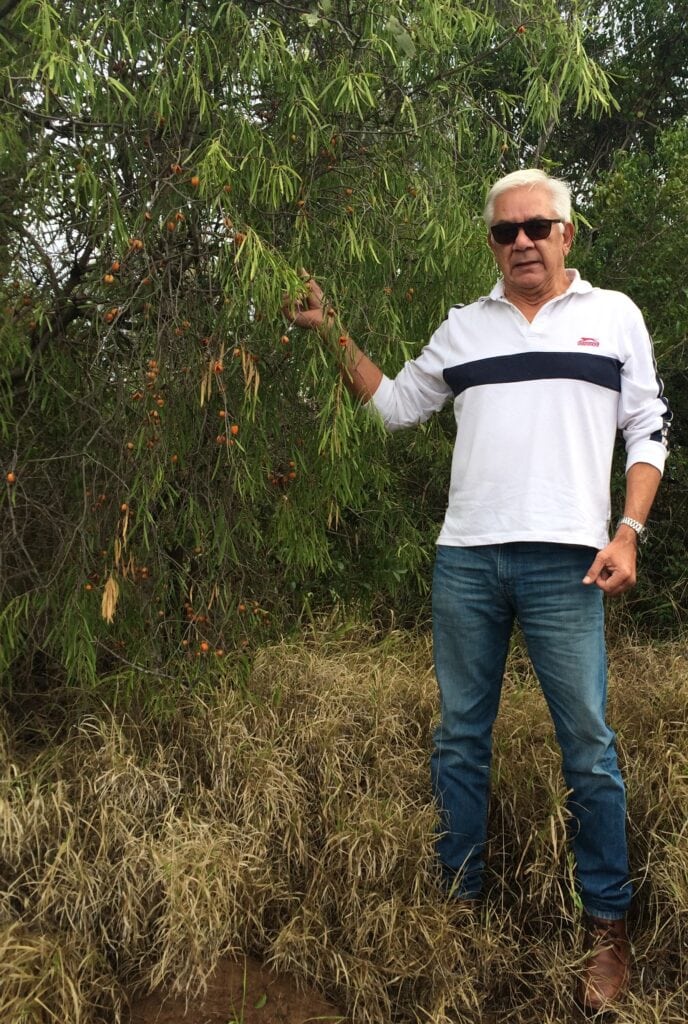Indigenous ecosystem knowledge has a voice on TERN’s independent Science Advisory Committee with the appointment of Mr Jim Walker, a lecturer at The University of Queensland’s School of Earth and Environmental Sciences. Jim has been involved in advocating for the rights of Indigenous Peoples for more than 25 years, both in Australia and internationally, and brings a wealth of knowledge and experience to TERN and its Science Advisory Committee of engaging with First Nations peoples to protect the health of our precious terrestrial and marine ecosystems.
Jim is of the Yiman, Goreng Goreng and Jagera First Nations Peoples of Australia. He brings to TERN a trans-disciplinary approach to research and its supporting infrastructure and an extensive high-level experience in engaging with Aboriginal and Torres Strait Islander organisations and communities across Australia.
Jim has been at the forefront of Indigenous engagement in excess of 25 years, and instrumental in the formulation and evaluation of policies and programs in the fields of social justice, education, economic development, Indigenous rights advocacy, and Indigenous cultural protection.
His professional experience extends to increasing Indigenous decision making in science research and engagement, centring Indigenous Knowledges in science curricula, development and implementation of policy and programs relating to environmental protection, and primary industries.

Since 2018, Jim has been teaching and incorporating traditional knowledge in the curriculum of several degrees within the Faculty of Science at The University of Queensland (UQ)
Working together to build shared knowledge of our ecosystems and their services
Jim promotes the value of Indigenous governance for scientific and environmental research projects, as the “best way to engage effectively and appropriately with Indigenous peoples.
“Working with Indigenous communities from across the continent can help to build a national collective database of regional and remote ecosystem health.
“If you are looking at climate change adaptation, then Indigenous peoples really are at the frontline. Indigenous communities are in regional and remote areas, and other environmentally important places. They work and live on Country and are the first contact for these changes.
When you put their experiences together you get a synergistic effect on how climate change is spreading across the continent. Indigenous peoples are also helping with healing Australia.
For example, as cultural burns are not as hot, there is a reduction of carbon into the atmosphere.
Indigenous title exists across 40 per cent of Australia; our ways of knowing and environmental management have sustained this continent for more than 2000 generations, so it’s good sense and good business to engage with Aboriginal and Torres Strait Islander people in the healing of this country, now and in the future.
Engagement with Indigenous peoples and knowledges in response to climate change globally will not only mitigate the effects of climate change but will also deliver economic, environmental, social and cultural benefits that will have positive outcomes for the planet and humankind.”
Mr Jim Walker, TERN Science Advisory Committee
25 years of Indigenous advocacy
Since 2018, Jim has been teaching and incorporating traditional knowledge in the curriculum of several degrees within the Faculty of Science at The University of Queensland (UQ), including Cultural Heritage Management. He is also working to develop a second year Course in Indigenous Traditional Knowledge as part of UQ’s Bachelor of Science.
Prior to UQ. he has worked within the Aboriginal and Torres Strait Islander Commission at executive and senior management level and was previously the Manager of the CSIRO’s National Indigenous Engagement Strategy.
Jim is also a Member of the Foundation for Aboriginal and Islander Research Action (FAIRA), Chair of the Murri Mura Aboriginal Corporation, Board of Advice member of the Queensland Aboriginal and Torres Strait Islander Foundation, and a member of EarthWatch Australia’s Scientific Advisory Committee.
He has also been a previous Chair of the Indigenous Caucus within the World Intellectual Property Organization Intergovernmental Committee on the Protection of Intellectual Property, Traditional Knowledge and Traditional Cultural Expressions.
Jim holds a Bachelor of Business and a Masters Degree in Public Administration.
A deadly solution
Jim is also part of a A$1.5 million Australian Research Council (ARC) funded project promoting bush foods and creating long-lasting Indigenous businesses.
The ARC funded project, which is called ‘A Deadly Solution: Towards an Indigenous-led bushfood industry,’ is working to increase Indigenous participation by enabling collaborations between researchers and Indigenous communities around the commercialisation of native bushfoods and ornamental plants. It puts Traditional Knowledge with Western science together to produce native Australian bushfoods and create sustainable, intergenerational Indigenous livelihoods across several Australian biomes in a time of rapid climate change.
“The preservation and promotion of these foods also contributes knowledge as to possible future food alternatives (and thereby, contributes to food security) as Western crops begin to fail in growing marginal areas as a result of climate change.”
Mr Jim Walker, TERN Science Advisory Committee
Independent Science Advisory Committee (SAC)
The independent Science Advisory Committee provides scientific and strategic advice to the TERN Advisory Board and TERN Director that helps to optimise TERN’s investment in terrestrial ecosystem monitoring research infrastructure and data sets in support of Australia’s world class biodiversity, climate and soils research.
Since August 2021, TERN’s SAC has been chaired by Distinguished Professor Belinda Medlyn of the University of Western Sydney.
Science Advisory Committee members
- Distinguished Prof Belinda Medlyn – Chair
- Dr Margaret Byrne – Deputy Chair (WA Dept Biodiversity, Conservation and Attractions)
- Prof Adrienne Nicotra (Australian National University)
- Prof Alex McBratney FAA (University of Queensland)
- Prof Andy Pitman AO FAA ((University of New South Wales)
- Mr Jim Walker (The University of Queensland)
- Prof Megan Lewis (The University of Adelaide)
- Dr Ross Wilkinson (independent)






